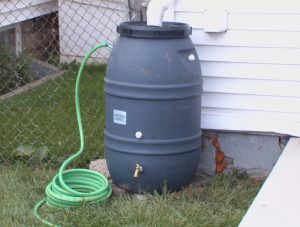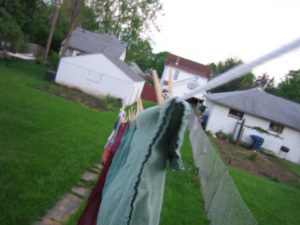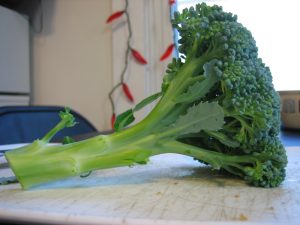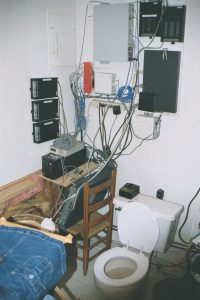I recently met with a local organization involved in environmental education efforts to talk about the status of sustainability education in Richmond and Wayne County. In preparing for that conversation, I put together a list of what I see as some of the challenges our community faces when it comes to becoming more sustainable and self-reliant: Continue reading "Sustainability challenges in Richmond"
Tag: peak oil
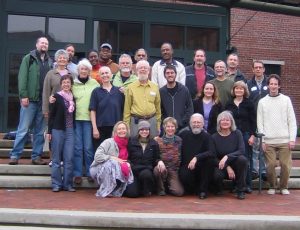 I'm just back from a weekend-long gathering in Bloomington, Indiana, where I was joined by ~25 other fine folks for a "Transition Training" event. The Transition US movement is part of a vibrant, international grassroots movement that builds community resilience in response to the challenges of peak oil, climate change and the economic crisis. Today's edition of the New York Times Magazine had a cover story featuring the Transition movement, including one of the facilitators who I had the benefit of working with this weekend, Michael Brownlee.
I'm just back from a weekend-long gathering in Bloomington, Indiana, where I was joined by ~25 other fine folks for a "Transition Training" event. The Transition US movement is part of a vibrant, international grassroots movement that builds community resilience in response to the challenges of peak oil, climate change and the economic crisis. Today's edition of the New York Times Magazine had a cover story featuring the Transition movement, including one of the facilitators who I had the benefit of working with this weekend, Michael Brownlee.
A few thoughts on how it went, and what's next:
Continue reading "Reflections on Transition Training in Bloomington"
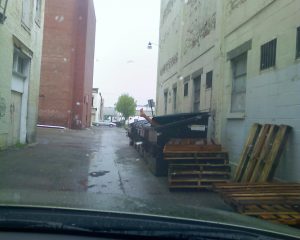 Quick reviews of three books I've taken in lately:
Quick reviews of three books I've taken in lately:
- Spycraft: The Secret History of the CIA's Spytechs, from Communism to al-Qaeda
by Wallace, Melton and Schleshinger
Fascinating, scary, and geeky. With great diagrams and photographs explaining how spy devices were constructed and worked, and with interesting stories about various successes and failures, all told from the perspective of the "techs" working behind the scenes to support operations. For someone interested in geopolitical history, technology, security issues and government secrecy, it was a must read and I enjoyed it thoroughly. Warning: the book minimizes any discussion of the ethical/moral/legal implications of the spycraft, and the human toll takes a backseat to the geekery.
Continue reading "Book Review Shorts: Spycraft, Religion, and Conspiracy"
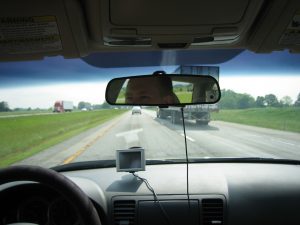 I don't usually read USA Today, but in doing so this morning I saw that there's a perverse new angle that some organizations are taking on the issue of U.S. immigration policy. It was manifested in an advertisement taken out on page 2 of the front section, with a single photo of a long line of traffic at a stop on an interstate highway. The text in the ad basically says that illegal immigrants from Mexico, in their unending contribution to the population here, are causing Americans to have to sit in traffic congestion longer than ever before. The call to action is clear: if you want your freedom to drive wherever you want whenever you want to remain intact, we have to keep those Mexicans out of our country.
I don't usually read USA Today, but in doing so this morning I saw that there's a perverse new angle that some organizations are taking on the issue of U.S. immigration policy. It was manifested in an advertisement taken out on page 2 of the front section, with a single photo of a long line of traffic at a stop on an interstate highway. The text in the ad basically says that illegal immigrants from Mexico, in their unending contribution to the population here, are causing Americans to have to sit in traffic congestion longer than ever before. The call to action is clear: if you want your freedom to drive wherever you want whenever you want to remain intact, we have to keep those Mexicans out of our country.
Oh my.
Continue reading "A scary new angle on immigration: traffic congestion"
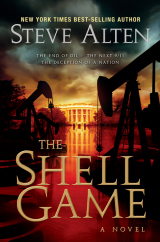 If you read political thrillers or action novels for their ability to transport you away from the concerns of current events into a fantasy that seems realistic but is purely fictional, then Steve Alten's book The Shell Game is probably not for you. And I wouldn't blame you; most folks probably don't want anxieties about their real lives and the future of our society to be a central part of the escapist action and adventure reading that we do on the beach. But after I heard that the book takes on the realities of peak oil, government corruption, American foreign policy and the political futures of today's Presidential candidates, and weaves them all into a 466 page novel, I couldn't help but be intrigued by it. Here's my review, some spoilers if you read on.
If you read political thrillers or action novels for their ability to transport you away from the concerns of current events into a fantasy that seems realistic but is purely fictional, then Steve Alten's book The Shell Game is probably not for you. And I wouldn't blame you; most folks probably don't want anxieties about their real lives and the future of our society to be a central part of the escapist action and adventure reading that we do on the beach. But after I heard that the book takes on the realities of peak oil, government corruption, American foreign policy and the political futures of today's Presidential candidates, and weaves them all into a 466 page novel, I couldn't help but be intrigued by it. Here's my review, some spoilers if you read on.
Continue reading "Steve Alten's The Shell Game"
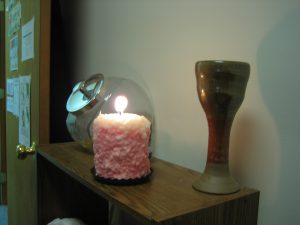 Earlier tonight I had the honor of being a guest speaker at the monthly meeting for the Economic Development Corporation of Wayne County's board of directors, presenting a version of my talk on how we can build a more self-reliant Richmond, Indiana in the face of peaking availability of natural energy resources, global climate change, and the decline of the U.S. dollar. As I said about the November 2007 presentation, it was somewhat especially nerve-wracking because the topics covered are so important to me and, in my view, so important to the future of this community. Today it was also always a growing experience to step beyond the safety of the traditional, "business world/tech guy" kinds of interactions I have with some of these folks, exposing another side of my interests and passions along the way.
Earlier tonight I had the honor of being a guest speaker at the monthly meeting for the Economic Development Corporation of Wayne County's board of directors, presenting a version of my talk on how we can build a more self-reliant Richmond, Indiana in the face of peaking availability of natural energy resources, global climate change, and the decline of the U.S. dollar. As I said about the November 2007 presentation, it was somewhat especially nerve-wracking because the topics covered are so important to me and, in my view, so important to the future of this community. Today it was also always a growing experience to step beyond the safety of the traditional, "business world/tech guy" kinds of interactions I have with some of these folks, exposing another side of my interests and passions along the way.
Continue reading "Presenting to the EDC Board on Peak Oil"
 As I mentioned when I came back from the energy conference in October, I was going to give a talk in November called "Going Local: Building a Self-Reliant Richmond, Indiana". I had agreed to speak earlier in the year and didn't really know what I was going to talk about beyond the expectation that it would fit into the "sustainability" theme of the series of talks in which I was participating and have some focus on peak oil and related topics.
As I mentioned when I came back from the energy conference in October, I was going to give a talk in November called "Going Local: Building a Self-Reliant Richmond, Indiana". I had agreed to speak earlier in the year and didn't really know what I was going to talk about beyond the expectation that it would fit into the "sustainability" theme of the series of talks in which I was participating and have some focus on peak oil and related topics.
It turned into one of my most intense speaking experiences to date.
Continue reading "Going Local: Building a Self-Reliant Richmond, Indiana"
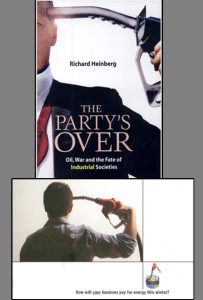 I've blogged before about turning points in awareness of the issues that we face with regard to "the environment" and the energy crisis. Today I received a postcard in the mail with a photo of a man holding a gasoline pump nozzle up to his head, in an image that unavoidably evokes a suicide act in progress for most Westerners.
I've blogged before about turning points in awareness of the issues that we face with regard to "the environment" and the energy crisis. Today I received a postcard in the mail with a photo of a man holding a gasoline pump nozzle up to his head, in an image that unavoidably evokes a suicide act in progress for most Westerners.
I, having met Richard Heinberg and read his book The Party's Over: Oil, War and the Fate of Industrial Societies, of course presumed it was something related to addressing the impact of the end of abundant, cheap oil. The cover has a very similar image that complements the book's exploration of our relationship to oil. But when I visited the website that the postcard mysteriously directed me to, I found that it was an ad for...a credit card company. Their solution to the energy crisis? Gas credits when you make lots of charges on your card. You know we've reached a new level (high or low, I can't say) of public attention to the state of affairs when credit card companies think they can make a few dollars off of people who are worried about our dependence on oil.
If you're interested in a more effective approach than "going into debt for Mother Earth," you could join me at the upcoming Fourth Annual Conference on Peak Oil and Community Solutions, in Yellow Springs, Ohio, where Heinberg will be speaking. It's always a smashing good time, grounded in an accessible exploration of real community-based solutions.
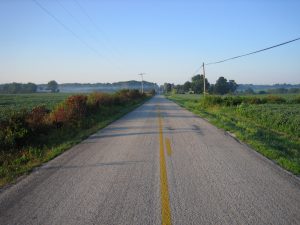 During the Third U.S. Conference on Peak Oil and Community Solutions that I attended last month, I found myself surrounded by an amazing group of hundreds of people who were trying to make changes in the world to move us (the human species) toward sustainability. While I do not limit my thinking on sustainability to the slogan "be the change you want to see in the world" (article on that is forthcoming), I thought it might be useful to take an inventory of the things I'm doing in my own life to reduce my impact on the world and my resource usage in our culture. I also thought it would be important to start to list the areas where I still need to make progress.
During the Third U.S. Conference on Peak Oil and Community Solutions that I attended last month, I found myself surrounded by an amazing group of hundreds of people who were trying to make changes in the world to move us (the human species) toward sustainability. While I do not limit my thinking on sustainability to the slogan "be the change you want to see in the world" (article on that is forthcoming), I thought it might be useful to take an inventory of the things I'm doing in my own life to reduce my impact on the world and my resource usage in our culture. I also thought it would be important to start to list the areas where I still need to make progress.
I don't publish this information as any sort of prescription for anyone else; there are millions of ways to make changes in our lives to do less harm, and not all of them look anything like the below (and some of them contradict the below), so I fully respect that this is what works for me as I experiment, and it may not work for anyone else. There is no one right way to be more sustainable. However, if you find this list useful, or have suggestions or feedback on it, I hope you'll contact me to let me know.
Things I do in my life to reduce my unsustainable resource usage:
- I've created, participate in and financially support multiple community-oriented programs that promote and educate others around messages related to sustainability.
 I have a rain barrel in my yard to collect rainwater for use in gardening and yard work. It reduces the amount of filtered and treated city water I use by just a little bit, but rainwater is also better for my plants.
I have a rain barrel in my yard to collect rainwater for use in gardening and yard work. It reduces the amount of filtered and treated city water I use by just a little bit, but rainwater is also better for my plants.- I mow my yard less than neighborly convention might dictate. I'm working on using a scythe to replace my gas-powered mower (and increase my physical exercise!).
- I replaced the old drafty windows in my house with newer and more sealed ones. This helps reduce the energy needed to keep me comfortable inside. Unfortunately, the replacement windows are made up significantly of petroleum-based products.
- I had a super high-efficiency furnace installed in my house.
- I don't use air conditioning at my house more than 3 or 4 days per year, and use ceiling fans, window shading, and other methods instead. (I do, however, work in an air-conditioned office, so I can't claim to be braving the heat every day.)
- I live in a small town that is easy to get around, has the potential for great community-building, and has a heritage that involves peace and justice, sustainable agriculture and entrepreneurial solutions to difficult problems.
- I've replaced all of the conventional incandescent light bulbs in my house with compact fluorescent bulbs. These are supposed to last much longer and use much less energy.
- I wash my dishes by hand.
- I purchased a high-efficiency front-loading washing machine
 I also purchased a high-efficiency drier, but there really isn't such a thing, so I try to use a clothesline to dry my laundry in the sun when I can.
I also purchased a high-efficiency drier, but there really isn't such a thing, so I try to use a clothesline to dry my laundry in the sun when I can.- I have been working on putting my appliances that use phantom power on power strips that I can turn off when I'm not using them.
- I participate in my city's recycling program
- I compost all organic waste from my cooking and store it in the big compost bin next to my garden.
- I try to buy goods and services from local businesses when possible. This reduces the amount of resources required to bring those items to me, and supports a strong local economy that can be more resilient to fluctuations in energy prices. I especially try not to buy goods and services from businesses that I feel are actively harming local/regional/national natural resources, engaging in slave labor, or participating in the cultural trends toward sacrificing our planet and its lifeforms in the name of increased consumerism.
- I support my local food cooperative by volunteering and serving on their board of directors, and by ordering household staples in bulk from them.
- I try to avoid eating food that will poison my body and potentially increase the resources needed to keep me healthy (now or in the future)
- I avoid buying new products and clothing when I can find them in like-new condition by shopping at Goodwill or the Salvation Army.
- I have installed or am installing low-flow shower heads in my showers.
- I avoid using household chemical products that pollute and cause medical problems
- I ride my bicycle when I have time. Having time to ride a bike is a relative/subjective/complex thing, so I'm working on ways to make more time for riding instead of driving.
- I walk places when I have time. Having time to walk is a relative/subjective/complex thing, so I'm working on ways to make more time for walking.
- When I do drive, I drive a car that gets reasonably high gas mileage (i.e. not an SUV) and I try to minimize my trips.
 I have a garden where I sometimes grow my own food instead of buying it from retailers who have produced it with a variety of chemicals, packaged it with a variety of non-reusable materials, and shipped it from all around the world using a variety of petroleum resources.
I have a garden where I sometimes grow my own food instead of buying it from retailers who have produced it with a variety of chemicals, packaged it with a variety of non-reusable materials, and shipped it from all around the world using a variety of petroleum resources.- I work on sharing tools and equipment with my neighbors when we can.
- At the company I co-own, I direct our management and "human resources" practices to encourage community and sustainability in our business activities.
Things I do in my life that aren't so sustainable, or areas where I could improve (a beginning list...I'm sure this could be quite long if one looked at all the details):
- I live in and contribute to a culture that is inherently unsustainable
- My day job is centered around the use of computers and related electronics equipment , which are some of the most wasteful and energy-intensive products to produce in the world. Their production, usage and disposal is one of the top contributors to environmental pollution, workforce exploitation, and global consumerism in the world.
- I still buy lots of goods and services from non-local businesses, and/or businesses that actively participate in harm against the land or against other people.
- I have too much stuff in my house. Too much stuff means more time and energy spent managing and repairing that stuff, and less time having fun. I need to have more fun and less stuff.
- I don't bike or walk nearly as much as I could if I made more changes to support that lifestyle.
 I don't grow nearly as much food as I could if I made more changes to support that lifestyle.
I don't grow nearly as much food as I could if I made more changes to support that lifestyle.- I still eat foods that poison my body.
- A significant portion of my income helps to fund violence and oppression committed against people around the world.
- I don't put enough energy into being a more active participant in my community - getting to know my neighbors, developing relationships that allow me to give support and get support, etc.
- ...
The adventure of doing all of the above is certainly not reflected in these simple bullet listings. In some cases, they were simple changes that required little or no money or time. Others were significant financial investments or major lifestyle changes. And many are ongoing, where I'm still feeling out the effects of my decisions and still finding ways to do better.
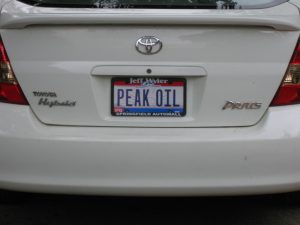 When gas prices go up, people tend to complain that something needs to be done about the problem. Many demand action from the local or federal government, gas companies, or fellow citizens. Like Jason Sparks, whose letter in the Pal-Item yesterday read, "Why is the government not stepping in?...How are we supposed to pay the bills?...Let's shut down the country, then maybe someone would step in. We cannot afford this." Or Brad Hall, who was quoted in an article today asking, "What's going to be next?...How're people going to survive and get around?"
When gas prices go up, people tend to complain that something needs to be done about the problem. Many demand action from the local or federal government, gas companies, or fellow citizens. Like Jason Sparks, whose letter in the Pal-Item yesterday read, "Why is the government not stepping in?...How are we supposed to pay the bills?...Let's shut down the country, then maybe someone would step in. We cannot afford this." Or Brad Hall, who was quoted in an article today asking, "What's going to be next?...How're people going to survive and get around?"
That's the question, indeed.
Continue reading "Gas prices and New Minds"

